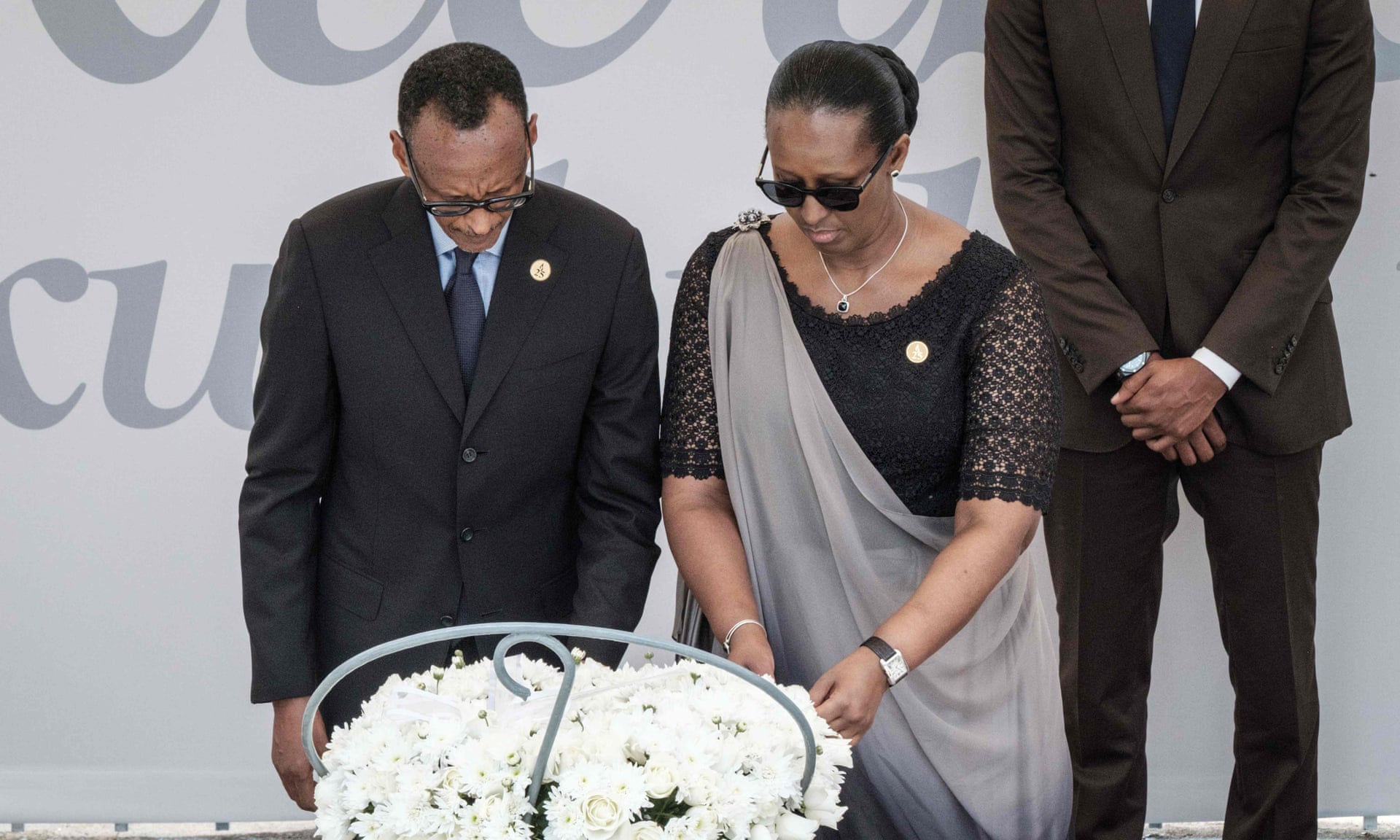Rwanda has begun a solemn commemoration of 800,000 people killed with knives, clubs and other weapons during three months of genocide of 1994.
The president, Paul Kagame, laid a wreath at a memorial site where more than 250,000 people are buried in the capital, Kigali. Songs were sung and poems recited at the beginning of a week of events.
Speaking after the ceremony, Kagame pledged that history would never repeat itself. “That is our firm commitment. Our bodies and minds bear amputations and scars but none of us is alone. Together we have woven the tattered threads of our unity into a new tapestry.”
He said Rwandans had granted themselves a new beginning and were “wounded and heartbroken … but unvanquished”.
Officials and foreign dignitaries joined around 2,000 people in a “walk to remember” from Rwanda’s parliament to the national football stadium, where candles were to be lit in a night vigil.
The vast majority of the victims of the genocide were from Rwanda’s Tutsi minority, though some Hutu moderates also died.
Alice Mukarurinda, 49, whose child was killed by Hutu extremists, said she had forgiven those responsible for the mass murder.
“The anger can never give you peace. Some Hutus were killed too while protecting Tutsi friends. It was a bad leadership of the past to blame. Those who killed my families have apologised to me and I have forgiven them. The future is important to us.”
Jackie Mukamana, from Bugesera, said: “Today we live a better life and the children of Hutus and Tutsi attend the same schools and opportunities are offered equally. I can’t seek revenge because when you kill the person who murdered your relatives, you’ll become like that murderer.”
The 100 days of killing began on 6 April 1994 after the then president, Juvénal Habyarimana, and his Burundian counterpart, Cyprien Ntaryamira, both Hutus, died when their plane was shot down over the Rwandan capital. Those responsible have never been identified.

Hutu government soldiers and allied extremist militias orchestrated a campaign to exterminate the Tutsi minority. In villages across the densely populated country, neighbour turned on neighbour as men, women and children were burned alive, hacked to death, clubbed and shot. Up to 250,000 women and girls were raped, often repeatedly.
Seventy per cent of the minority Tutsi population was wiped out, and more than 10% of the total Rwandan population.
Jean Claude Kalekezi wept as he told the Guardian on Sunday how he had lost 12 members of his family in Nyamata, an hour’s drive from the capital.
“The government is telling us to forgive but there are perpetrators who have kept quiet about the [location of the] graves of our dead relatives. Houses are built on the graves of our people. Others forgive but I never will,” Kalekezi said.
Preliminary results of a 2018 national survey found 35% of survivors aged between 25 and 65 years reported symptoms linked to mental health problems.
The commemoration itself could trigger traumatic memories. “Some really struggle with it, especially those who haven’t had help,” said Dr Jemma Hogwood, a clinical psychologist who works with the Survivors’ Fund (Surf), an NGO dedicated to helping survivors of the genocide to rebuild their lives.
“There is an expectation to join in public events. For some that is very helpful, but for others it is very different. We try to think with people about how to grieve and remember, and [explain] that is OK to remember however you want to remember,” Hogwood said.
The needs of survivors change over time. Victims of rape now have children who are adults, for example. “There was an immediate need to deal with trauma, but there are different issues now,” Hogwood said. “Mothers started coming to Surf asking: ‘How do we tell our children who their father was?’ They are adults now and they want to get married. The identity of their father is very important. Often the perpetrators remain within communities.”

The killing ended in July 1994 when the Rwandan Patriotic Front (RPF), a Tutsi-led rebel movement led by Kagame, invaded from Uganda and seized control of the country. Kagame has in effect been the leader of the country – first as vice-president and then as president – ever since.
One of Africa’s most divisive figures, Kagame is seen by supporters as an incorruptible and visionary leader who brought security and development to a shattered nation. Critics say he is a ruthless authoritarian propped up by a gullible and guilty international community which failed to intervene to stop the genocide 25 years ago.
“You have to accept that in some areas things have gone really well. Kagame got the economy going, rebuilt the infrastructure, generated investment, and the level of stability is impressive,” said Nic Cheeseman, a professor of democracy and international development at Birmingham University in the UK.
“But there are things that are deeply concerning. The picture is of a government and an individual completely unwilling to tolerate any kind of dissent. The big question is: can he preside over a transition and create a Rwanda that can exist without him as a ruler?”













